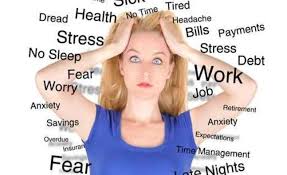A State of Illinois Licensed Psychological Association (License #098.000088)
Western Suburbs
114 Allen Court, Clarendon Hills, IL 60514
Phone: 630-986-5500
Skype and Face Time Sessions Available

Anxiety
What is Anxiety? How Do I Know When to Seek Treatment?
Anxiety disorders are serious medical illnesses affecting millions of Americans. These disorders fill people's lives with overwhelming anxiety and fear. Unlike relatively mild, or brief anxiety caused by stressful events (e.g. business presentations or a first date), anxiety disorders are chronic and relentless, and can grow progressively worse if not treated. Everyone feels anxious and under stress from time to time. Such mild anxiety may help make you more alert and focused on facing threatening or challenging circumstances. On the other hand, anxiety disorders cause severe distress over a period of time and disrupt the lives of individuals suffering from them. The frequency and intensity of anxiety involved in these disorders is often debilitating. But fortunately, with proper and effective treatment, people suffering from anxiety disorders can lead normal lives.
Are There Different Types of Anxiety Disorders?
There are several major types of anxiety disorders.
Generalized Anxiety Disorder: Excessive anxiety and worry that lasts for at least six months accompanied by other physical and behavioral problems. A person may experience recurring fears or worries, about health or finances, for example, or have a persistent sense that something bad is just about to happen. The reason for the intense feelings of anxiety may be difficult to identify, but the fears and worries are very real and often keep individuals from concentrating on daily tasks.
Panic disorder: A sudden, uncontrollable attack of terror that can manifest itself with heart palpitations, dizziness, shortness of breath, and an out of control or terribly frightening feeling. A person may experience sudden, intense and unprovoked feelings of terror and dread. People who suffer from this disorder develop, more often than not, strong fears about when and where their next panic attack will occur. As a result, they often restrict their activities.
Fears and Phobias: Fears are present in both panic disorders and phobias. As such fears are a symptom of other disorders. Specific phobias involve the fear of specific things such as encountering certain animals or flying in airplanes, whereas social phobias involve fear of social settings or public places. Social phobia describes a persistent fear of situations in which the person feels they are being scrutinized by others.
Obsessive-Compulsive disorder: This disorder is characterized by persistent, uncontrollable and unwanted feelings or thoughts (obsessions) and routines or rituals in which individuals engage to try to prevent or rid themselves of these thoughts (compulsions). The repeated, intrusive and unwanted thoughts cause anxiety, and are often accompanied by ritualized behavior that relieve the anxiety. Examples of common compulsions include washing hands or cleaning one's house excessively for fear of germs, or checking over something repeatedly for errors.
Post-Traumatic Stress disorder: Occurs when someone experiences a severely distressing or traumatic event. Someone who suffers severe physical or emotional trauma from a natural disaster or serious accident or crime may experience symptoms of post-traumatic stress disorder. Recurring nightmares and/or flashbacks and unprovoked anger are common symptoms. A person's thoughts, feelings and behavior patterns become seriously affected by reminders of the event, sometimes months or even years after the traumatic experience.
What Are The Symptoms of Anxiety?
Anxiety disorders can affect anyone. Anxiety is often experienced when people hold in their fears until they begin to feel anxiety. The symptoms of an anxiety disorder include:
Chronic, exaggerated worry, tension, and irritability
Racing heart, pounding heart, or chest pains
Lightheadedness, dizziness, nausea
Shortness of breath
Trembling, twitching, muscle tension, shaking
Sweating, hot flashes or chills
Insomnia (trouble falling or staying asleep)
Nightmares
Restlessness
Feelings of unreality
Numbness or tingling
Fear of dying
Headaches
Feeling of going out of control or going crazy
Why Is It Important To Seek Treatment For Anxiety?
If left untreated, anxiety disorders can have severe consequences. For example, some people who suffer from recurring panic attacks avoid at all costs putting themselves in a situation that they fear may trigger an attack. Such avoidance behavior may create problems by conflicting with job requirements, family obligations or other basic activities of daily living.
Many people who suffer from an untreated anxiety disorder are prone to other psychological disorders, such as depression. They have a greater tendency to abuse alcohol and other drugs in an attempt to control their anxiety. Their relationships with family members, friends and coworkers may become very strained. Their job performance may falter.
What Helps?
Most cases of anxiety can be treated successfully by appropriately trained health and mental health care professionals. Licensed psychologists are highly qualified to diagnose and treat anxiety disorders. Individuals suffering from these disorders should seek a provider who is competent in a variety of therapeutic approaches. Cognitive and behavioral therapies have been found to be helpful as has hypnosis and hypnosis combined with behavioral therapy. Experienced mental health professionals have the added benefit of having helped other patients recover from anxiety disorders.
Family psychotherapy and group psychotherapy (typically involving individuals who are not related to one another) offer helpful approaches to treatment for some patients with anxiety disorders. In addition, mental health clinics or other specialized treatment programs dealing with specific disorders such as panic or phobias may also be available nearby.
What Can You Do Now?
1. Make an appointment with one of our clinicians for a comprehensive professional assessment and to put together a treatment plan for relieving the anxiety.
2. Make an appointment with your physician to rule out any physical cause of anxiety.
Sources: American Psychological Association, Substance Abuse and Mental Health Administration (Center for Mental Health Services)
What is Anxiety? How Do I Know When to Seek Treatment?
Anxiety disorders are serious medical illnesses affecting millions of Americans. These disorders fill people's lives with overwhelming anxiety and fear. Unlike relatively mild, or brief anxiety caused by stressful events (e.g. business presentations or a first date), anxiety disorders are chronic and relentless, and can grow progressively worse if not treated. Everyone feels anxious and under stress from time to time. Such mild anxiety may help make you more alert and focused on facing threatening or challenging circumstances. On the other hand, anxiety disorders cause severe distress over a period of time and disrupt the lives of individuals suffering from them. The frequency and intensity of anxiety involved in these disorders is often debilitating. But fortunately, with proper and effective treatment, people suffering from anxiety disorders can lead normal lives.
Are There Different Types of Anxiety Disorders?
There are several major types of anxiety disorders.
Generalized Anxiety Disorder: Excessive anxiety and worry that lasts for at least six months accompanied by other physical and behavioral problems. A person may experience recurring fears or worries, about health or finances, for example, or have a persistent sense that something bad is just about to happen. The reason for the intense feelings of anxiety may be difficult to identify, but the fears and worries are very real and often keep individuals from concentrating on daily tasks.
Panic disorder: A sudden, uncontrollable attack of terror that can manifest itself with heart palpitations, dizziness, shortness of breath, and an out of control or terribly frightening feeling. A person may experience sudden, intense and unprovoked feelings of terror and dread. People who suffer from this disorder develop, more often than not, strong fears about when and where their next panic attack will occur. As a result, they often restrict their activities.
Fears and Phobias: Fears are present in both panic disorders and phobias. As such fears are a symptom of other disorders. Specific phobias involve the fear of specific things such as encountering certain animals or flying in airplanes, whereas social phobias involve fear of social settings or public places. Social phobia describes a persistent fear of situations in which the person feels they are being scrutinized by others.
Obsessive-Compulsive disorder: This disorder is characterized by persistent, uncontrollable and unwanted feelings or thoughts (obsessions) and routines or rituals in which individuals engage to try to prevent or rid themselves of these thoughts (compulsions). The repeated, intrusive and unwanted thoughts cause anxiety, and are often accompanied by ritualized behavior that relieve the anxiety. Examples of common compulsions include washing hands or cleaning one's house excessively for fear of germs, or checking over something repeatedly for errors.
Post-Traumatic Stress disorder: Occurs when someone experiences a severely distressing or traumatic event. Someone who suffers severe physical or emotional trauma from a natural disaster or serious accident or crime may experience symptoms of post-traumatic stress disorder. Recurring nightmares and/or flashbacks and unprovoked anger are common symptoms. A person's thoughts, feelings and behavior patterns become seriously affected by reminders of the event, sometimes months or even years after the traumatic experience.
What Are The Symptoms of Anxiety?
Anxiety disorders can affect anyone. Anxiety is often experienced when people hold in their fears until they begin to feel anxiety. The symptoms of an anxiety disorder include:
Chronic, exaggerated worry, tension, and irritability
Racing heart, pounding heart, or chest pains
Lightheadedness, dizziness, nausea
Shortness of breath
Trembling, twitching, muscle tension, shaking
Sweating, hot flashes or chills
Insomnia (trouble falling or staying asleep)
Nightmares
Restlessness
Feelings of unreality
Numbness or tingling
Fear of dying
Headaches
Feeling of going out of control or going crazy
Why Is It Important To Seek Treatment For Anxiety?
If left untreated, anxiety disorders can have severe consequences. For example, some people who suffer from recurring panic attacks avoid at all costs putting themselves in a situation that they fear may trigger an attack. Such avoidance behavior may create problems by conflicting with job requirements, family obligations or other basic activities of daily living.
Many people who suffer from an untreated anxiety disorder are prone to other psychological disorders, such as depression. They have a greater tendency to abuse alcohol and other drugs in an attempt to control their anxiety. Their relationships with family members, friends and coworkers may become very strained. Their job performance may falter.
What Helps?
Most cases of anxiety can be treated successfully by appropriately trained health and mental health care professionals. Licensed psychologists are highly qualified to diagnose and treat anxiety disorders. Individuals suffering from these disorders should seek a provider who is competent in a variety of therapeutic approaches. Cognitive and behavioral therapies have been found to be helpful as has hypnosis and hypnosis combined with behavioral therapy. Experienced mental health professionals have the added benefit of having helped other patients recover from anxiety disorders.
Family psychotherapy and group psychotherapy (typically involving individuals who are not related to one another) offer helpful approaches to treatment for some patients with anxiety disorders. In addition, mental health clinics or other specialized treatment programs dealing with specific disorders such as panic or phobias may also be available nearby.
What Can You Do Now?
1. Make an appointment with one of our clinicians for a comprehensive professional assessment and to put together a treatment plan for relieving the anxiety.
2. Make an appointment with your physician to rule out any physical cause of anxiety.
Sources: American Psychological Association, Substance Abuse and Mental Health Administration (Center for Mental Health Services)
Call Today For an Appointment
312-630-1001 Chicago
630-986-5500 Western Suburbs

Press or Click on this Button to Pre-Register
